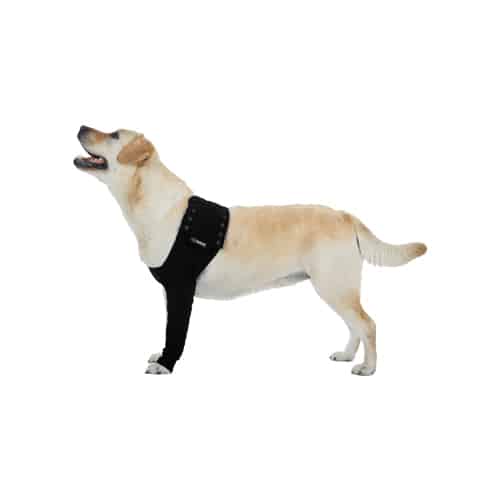
When it comes to giving your dog a treat, it’s understandable that some people get confused over one particular dog favourite which is peanut butter. After all, you can get dog treats flavoured with peanut butter so why not just give them peanut butter as a treat when you’re making yourself a sandwich?
Can I give my dog peanut butter? Yes, provided that the peanut butter does not contain the sweetener known as xylitol or chocolate. Also, your dog must not be overweight or on a special diet for health reasons. Peanut butter is a really good treat for training purposes or as a novelty in toys to occupy them from boredom or simply challenging that inquisitive behaviour with a puzzle toy.
If you would like to know more about the ins and outs of giving your pooch peanut butter and some of the things to look out for, you can learn more below. We have looked at some of the key concerns as well as the best ways to use the delicious sweet treat to keep your four-legged friend happy.
What Do You Need to Look Out For?
Not all peanut butter brands are equal and not all of them are safe for your pooch. Below are two of the main things you need to look out for in peanut butter before you consider giving any to your dog:

Xylitol
Xylitol is a sweetener that is used in a wide range of food products. This includes toothpaste, chewing gum, mints, some yoghurts, and peanut butter among other things. When humans consume products that contain this sweetener there is generally no problem, as it is safe for human consumption. However, it can be potentially fatal for dogs, as it can result in liver failure, seizures, and can lead to death in a very short space of time.
Given the toxicity of xylitol when it comes to dogs, it is vital that you check the peanut butter you buy so you can be sure it does not contain the sweetener xylitol.
With an increasing number of people looking for low-calorie alternatives the use of this sweetening product is on the increase. Although many peanut butter brands do not contain xylitol, there is an increasing number that does. You need to bear in mind that even small amounts of this sweetener can be toxic for your pet.
Palm Oil
Another ingredient to look out for in peanut butter is palm oil. This is sometimes used in place of peanut oil, as it is a cheaper alternative for manufacturers. So, if you buy a lower-quality or cheaper peanut butter brand, you may find that it contains palm oil rather than peanut oil.
The good news is that palm oil is not toxic to dogs like xylitol is. In addition, if your dog does ingest some peanut butter with palm oil in, it is unlikely to have any major impact. Having said that, it can affect some dogs adversely, so it is best to avoid buying or giving peanut butter that contains this cheaper oil.
Some of the adverse effects of peanut butter with palm oil may include diarrhoea and an upset stomach. This is generally if your dog has ingested a larger amount of peanut butter with this oil. However, you also need to remember that this oil is very high in saturated vegetable fat, which means that your dog’s digestive system may struggle with it.
What Are the Best Ways to Give Dogs Peanut Butter?
One of the things that dog owners are often curious about is how to give their dogs peanut butter. Well, ideally in small amounts and in moderation.
For instance, you can give them dog-safe peanut butter as part of your training as a reward. You can also give them peanut butter in treat toys and make them work for the nutty goodness!
If you tend to give your dog peanut butter on a more regular basis, such as when you go through daily training, it is best to opt for an unsalted one. Obviously, you should also make sure it does not contain xylitol or palm oil.
It can be very effective if you want your dog to comply with your commands during training – some dogs will do anything for peanut butter!
Many people give their dogs peanut butter in treat toys, as this means they are not going to wolf it down and it will keep them busy and happy for hours on end.
Having said that, you should also remember that no more than 10 percent of your dog’s diet should be made up of treats, and peanut butter definitely counts as a treat.
So, try to change things up by also giving your dog healthy treats rather than relying solely on peanut butter to keep your pooch happy.
Are There Health Benefits to Giving Dogs Peanut Butter?
As we have already mentioned, dogs do love peanut butter, but you have to be extremely careful that you do not give them one that contains xylitol.

So, what about the upside of giving your pooch this tasty treat from time to time? Well, there are plenty of health benefits that your pet can enjoy from eating peanut butter. This includes:
Protein
Protein is a nutrient that is essential to the health of your pet. While there are various sources that your dog can get protein from, peanut butter is a great treat option if you need to boost your pet’s protein levels.
Protein helps with your dog’s overall functioning and provides your pet with vital amino acids. In addition, it helps to improve the appearance and condition of the coat and skin as well as aiding muscle development.
Niacin
Niacin is another important mineral that helps in the proper functioning of your dog’s body and aids health in a variety of ways. It can help to boost your dog’s metabolism and helps with the effective breakdown of fatty acids.
It can also help with healthier skin and helps to give your pet more energy. This makes it ideal for dogs who are more active and require more exercise.
Vitamins B and E
According to the American Kennel Club, vitamins B and E are among a number of key vitamins that can aid the health of your pet.
B vitamins are essential to your dog’s health for a variety of reasons. This includes helping with the function of enzymes, providing energy, generating glucose, aiding the nervous system, boosting immune responses, and regulating hormones among other things.
Vitamin E is also important for your pet, and also provides a range of valuable benefits to your pet. This vitamin helps to protect against oxidative damage as well as the metabolism of fat and the proper functioning of cells.
Dogs that are deficient in this vitamin could suffer from health problems such as muscle degeneration, eye problems, and issues with reproduction amongst other things.
When Should You Not Give Your Dog Peanut Butter?
As you can see peanut butter is safe. However, there are also cases where you should not give your dog peanut butter, or you should seek veterinary advice before doing so. This includes instances such as:
When Your Dog is Overweight
- Your Dog is Overweight
- Your Dog Has Special Dietary Requirements
- Your Dog Has Special Dietary Requirements
- Your Pet Suffers from Certain Health Conditions
- Your Dog Is Allergic to Peanuts
- You Are Unsure About the Ingredients
Your Dog Is Overweight
There are various dog breeds that have a tendency to put on weight very easily. As with humans, weight problems like obesity can pose huge health risks for dogs. So, if your pet is already overweight, dishing out regular doses of peanut butter may not be the best thing.
If you are in any doubt, it is best to speak to your veterinarian to determine whether and how often your pet should be allowed this or any other treat.
The Dog Has Special Dietary Requirements
If your dog has any special dietary requirements, it is important to check with the vet before giving peanut butter. The vet may have put your dog on a special diet for health reasons and if you are unsure as to whether peanut butter is allowed as part of this diet, you need to ensure you double check beforehand.
Your Pet Suffers from Certain Health Conditions
There are certain health conditions that can impact on what your pet can and cannot safely consume. You may already be familiar with any forbidden foods associated with your dog’s health condition.
However, if you have any doubts, always check with the vet before you give your pet peanut butter. The last thing you want to do is worsen the condition or put your pet in danger, so it is best to err on the side of caution.
Is Your Dog Is Allergic to Peanuts?
Many people are allergic to nuts and ingesting any nut related product can cause serious health issues for them or even prove fatal. It is important to remember that pets can also suffer from these allergies, and these can manifest themselves in different ways.
Some possible symptoms of a peanut butter allergy include redness and itching of the skin, bald spots and hot spots, excessive licking, and breathing difficulties. If you have any concerns about whether your dog is allergic to nuts, make sure you speak to your vet.
If You Are Unsure About the Ingredients
There are instances where you may be unsure about the ingredients in the peanut butter. For instance, if someone has popped round with some peanut butter treats they have made for you, you won’t know whether the peanut butter has xylitol or palm oil in.
In these cases, do not give the treats to your dog, as you cannot afford to take that risk.
Only give your dog peanut butter that you have purchased yourself and/or where you are certain about the ingredients.
In a nutshell, you need to be absolutely certain that your dog is not going to suffer consequences by eating peanut butter before you let it have any.
It is all too tempting to give in when your pooch is looking up eagerly and begging for a treat, but it is vital that you are certain your dog is able to safely consume the peanut butter before you dish out this treat.
Top Tip
Keep your Peanut Butter in the fridge or cooler, this stops it from being runny.
Conclusion
One thing you should bear in mind when shopping for peanut butter is that manufacturers can change the ingredients that the product contains. So, don’t assume that just because you are used to a particular brand or product, it will be forever safe for your pet.
Make sure you always check the ingredients even if you are purchasing a familiar brand. This will enable you to ensure no ingredients have been added that may harm or cause discomfort for your pet.
It is best to stick to the higher quality brands where possible, as these are less likely to use the cheaper palm oil rather than peanut oil.
In addition, don’t go for the lower calorie options because these are far more likely to contain xylitol, which is highly dangerous for your pet.
Sticking to the more natural brands is a good bet, although even then you should check the ingredients just to be on the safe side.
So, as you can see, giving your pooch some peanut butter as a treat from time to time isn’t a problem. However, make sure it is just an occasional treat and not something you spoon-feed to your pet on a daily basis!
By keeping this type of treat as an occasional one, you can let your dogs enjoy the delicious peanut butter taste that they seem to love without all the possible risks.





